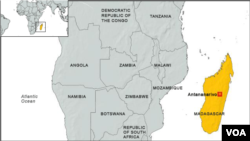Even for Madagascar, this is no ordinary bubonic plague outbreak.
The African nation has the world’s highest incidence of the bacterial infection that earned the grim name “the Black Death” after it killed an estimated 50 million people in the 14th century. The rat- and flea-borne illness hits the island nation every year from about December to April.
But this year is different, says the World Health Organization’s Dr. Eric Bertherat. This latest outbreak has popped up in a completely new area. The mountainous area of Befotaka in southeastern Madagascar has seen 68 cases — of which 27 have died — since the end of last year, according to WHO estimates.
Bertherat said there also are unconfirmed reports of a nearby second cluster, of some 30 cases.
“This outbreak occurred in a place where they had no plague case reported since 1950,” he told VOA from Geneva, after returning from a recent visit to Madagascar to assess the situation.
Pending rescue operation
Even more alarming, he says, is the fact that “it occurred in a very remote and insecure place where it’s very difficult to go. And that’s the main problem, for the time being. There is no one to control the outbreak because we are still trying to organize a kind of rescue operation to go there.”
Bertherat says plague is impossible to entirely eradicate — to do so, he said, would mean killing every plague-carrying wild animal, which is an impossible task, and very likely would disrupt a delicate ecological balance.
Even developed nations like the U.S. experience plague. The U.S. Centers for Disease Control (CDC) reported 16 cases in 2015. Four of those cases ended in death.
He says Madagascar is exceptionally susceptible, however, because of its persistent poverty. The spread of plague is often aided by poor sanitation and a lack of health care.
But why, with modern medicine and new rapid tests available in Madagascar, does this 14th century affliction appear to be growing?
Deforestation reconsidered
The answer, Bertherat says, may lie in a very modern trend: deforestation. Madagascar has seen massive deforestation because of illegal logging and as subsistence farmers continue to push into wild habitats.
“Our hypothesis,” he said, “is that this re-emergence in fact is due to the further extension of the natural focus of the migration of the rats, and also the fact that there is more and more contact between the local population and the forest area.”
Plague can be quickly diagnosed and easily treated with common antibiotics. Health officials in Madagascar are urging residents to seek immediate care if they live in plague-endemic areas and begin to experience flu-like symptoms.
Victims also can develop painful lymph-node swelling and gangrene on their extremities. Without life-saving antibiotics, about two-thirds of those infected will die, according to the CDC.





